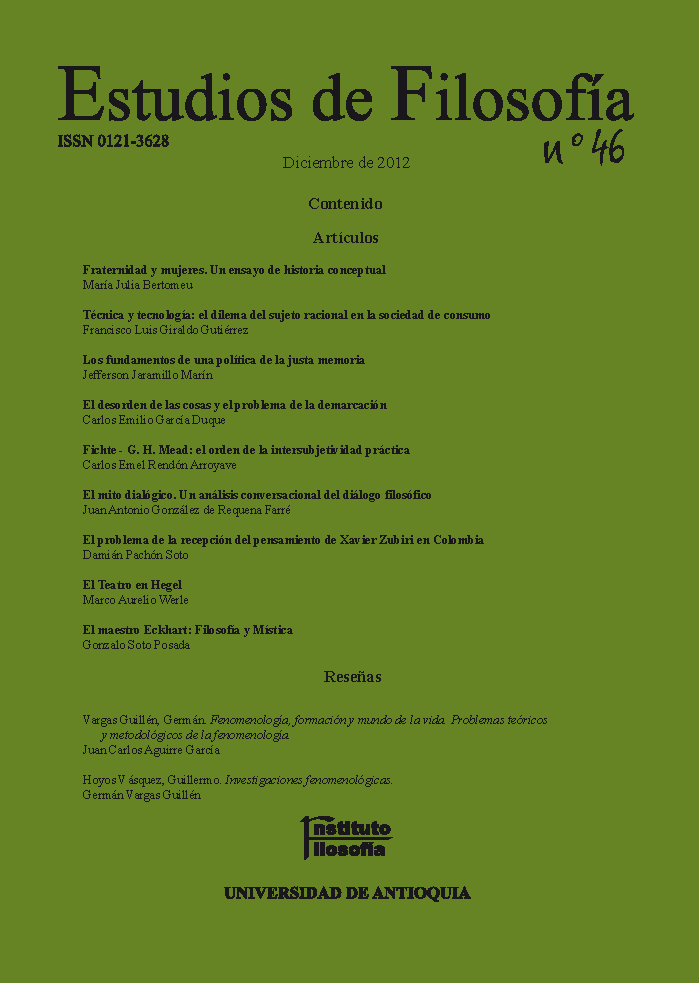The dialogical myth. A conversational analysis of philosophical dialogue
DOI:
https://doi.org/10.17533/udea.ef.14762Keywords:
Philosophical dialogue, Socratic dialogue, conversation analysis, ideology of dialogue.Abstract
The idealization of dialogue is not only a characteristic gesture of contemporary philosophical thought, but also of the humanities and of the pedagogical, therapeutic and organizational intervention procedures. In this article, we provide a critical review of the founding myth of Socratic dialogue through a conversation analysis of movements and discourse functions which are developed in it. In addition, we will explore the modern evolution of the genre of philosophical dialogue.
Downloads
References
ACKERMAN, B. (1989) “Why dialogue?” The Journal of Philosophy, vol. 86 (1), pp. 5-22. DOI: https://doi.org/10.2307/2027173
APEL, K.-O. (1991) Teoría de la verdad y ética del discurso. Barcelona: Paidós.
BAKHTIN, M. (1982) Estética de la creación verbal. México: Siglo XXI.
BECK, A. et al. (2005) Terapia cognitiva de los trastornos de personalidad. Barcelona: Paidós.
BERKELEY, G. (1985) Principios del conocimiento humano y Tres diálogos entre Hilas y Filonús. Barcelona: Orbis.
BLANCHOT, M. (1970) El diálogo inconcluso. Caracas: Monte Ávila Editores.
BOECIO. (1984) La consolación de la filosofía. Madrid: Sarpe.
BUBER, M. (2006) Yo y tú y otros ensayos. Buenos Aires: Lilmod.
BRUNO, G. (1985) Expulsión de la bestia triunfante. Barcelona: Orbis.
CICERÓN, M. T. (2007) Sobre el orador. Madrid: Gredos.
COLLI, G. (2000) El nacimiento de la filosofía. Barcelona: Tusquets.
CROMBIE, I. M. (1979) Análisis de las doctrinas de Platón 1. Madrid: Alianza Editorial.
DE BONO, E. (1995) El pensamiento paralelo. Barcelona: Paidós.
DELEUZE, G. (1989) La lógica del sentido. Barcelona: Paidós.
ECHEVERRÍA, R. (2003) Ontología del Lenguaje. Santiago de Chile: Juan Carlos Sáez.
FOUCAULT, M. (1987) El orden del discurso. Barcelona: Tusquets.
FRANKL, V. (1978) Psicoanálisis y existencialismo. México: F.C.E.
FREIRE, P. (1997) Pedagogía del oprimido. México: Siglo XXI.
GADAMER, H.-G. (2003) Verdad y método. Salamanca: Ediciones Sígueme.
GOFFMAN, E. (1987) La presentación de la persona en la vida cotidiana. Buenos Aires: Amorrortu.
HABERMAS, J. (1991) Problemas de legitimación en el capitalismo tardío. Buenos Aires: Amorrortu.
HABERMAS, J. (1999) Teoría de la acción comunicativa. Madrid: Taurus.
HALLIDAY, M. (2004) An Introduction to Functional Grammar. London: Arnold.
HEIDEGGER, M. (2002) De camino al habla. Barcelona: Ediciones del Serbal.
HUME, D. (2005) Diálogos sobre la religión natural. México: F.C.E.
LAUDAN, L. (1993) La ciencia y el relativismo. Madrid: Alianza Editorial.
LEVINAS, E. (1987) Totalidad e infinito. Salamanca: Ediciones Sígueme.
LIPMAN, M. (1998) Pensamiento complejo y educación. Madrid: De la Torre.
MARTÍNEZ MARZOA, F. (1996) Ser y diálogo. Madrid: Ediciones Istmo.
OAKESHOTT, M. (2000) El racionalismo en la política y otros ensayos. México: F.C.E.
PLATÓN. (1998) Protágoras. Gorgias. Carta Séptima. Madrid: Alianza Editorial.
SAN AGUSTÍN. (2009) Soliloquios: acerca de la vida feliz. Buenos Aires: Lumen Humanitas.
SCHELLING, F. W. J. (1985) Bruno o sobre el principio divino y natural de las cosas. Barcelona: Orbis.
SCHMITT, C. (2002) El concepto de lo político. Madrid: Alianza Editorial.
SÉNECA (2001) Diálogos. Madrid: Tecnos.
SHOTTER, J. (2001) Realidades conversacionales. Buenos Aires: Amorrortu.
TAYLOR, C. (1994) La ética de la autenticidad. Barcelona: Paidós.
VERNANT, J.-P. (1985) Mito y pensamiento en la Grecia antigua. Barcelona: Ariel.
VOLOSHINOV, V. (1992) El marxismo y la filosofía del lenguaje. Madrid: Alianza Editorial.
WOOFIT, R. (2005) Conversation analysis and discourse analysis: a comparative and critical introduction. London: Routledge.
Downloads
Published
How to Cite
Issue
Section
Categories
License
Copyright (c) 2012 Juan Antonio González de Requena Farré

This work is licensed under a Creative Commons Attribution-NonCommercial-ShareAlike 4.0 International License.
Authors who publish with this journal agree to the following terms:
1. The Author retains copyright in the Work, where the term "Work" shall include all digital objects that may result in subsequent electronic publication or distribution.
2. Upon acceptance of the Work, the author shall grant to the Publisher the right of first publication of the Work.
3. The Author shall grant to the Publisher a nonexclusive perpetual right and license to publish, archive, and make accessible the Work in whole or in part in all forms of media now or hereafter known under a Creative Commons Attribution-NoCommercia-ShareAlike (CC BY-NC-SA 4.0), or its equivalent, which, for the avoidance of doubt, allows others to copy, distribute, and transmit the Work under the following conditions: (a) Attribution: Other users must attribute the Work in the manner specified by the author as indicated on the journal Web site;(b) Noncommercial: Other users (including Publisher) may not use this Work for commercial purposes;
4. The Author is able to enter into separate, additional contractual arrangements for the nonexclusive distribution of the journal's published version of the Work (e.g., post it to an institutional repository or publish it in a book), as long as there is provided in the document an acknowledgement of its initial publication in this journal;
5. Authors are permitted, and Estudios de Filosofía promotes, to post online the preprint manuscript of the Work in institutional repositories or on their Websites prior to and during the submission process, as it can lead to productive exchanges, as well as earlier and greater citation of published work (see The Effect of Open Access). Any such posting made before acceptance and publication of the Work is expected be updated upon publication to include a reference to the Estudios de Filosofía's assigned URL to the Article and its final published version in Estudios de Filosofía.















